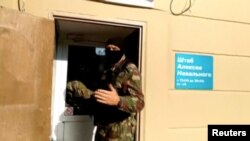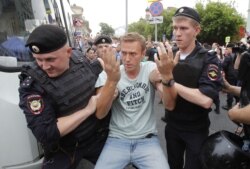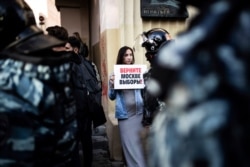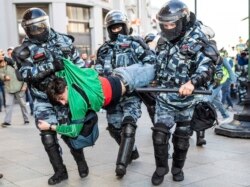Russian authorities launched a wave of police raids early Thursday targeting supporters of opposition leader Alexey Navalny in dozens of cities across Russia.
While police formally linked the raids to an ongoing investigation into money laundering by Navalny’s Anti-Corruption Foundation — known by its Russian acronym FBK, supporters say the moves were aimed at paralyzing the organization’s regional infrastructure.
The timing of the raids also seemed highly political — coming after a Navalny-backed "smart voting" strategy, a tactic that coordinated voter anger around candidates who had managed to clear registration barriers and was credited with significant losses for pro-Kremlin candidates in Moscow’s recent city council elections.
“Two words: ‘smart voting,’” bluntly explained Navalny, in a blog post titled "Putin is Mad and Stamping his Little Feet. Here's Why"
Leonid Volkov, Navalny’s chief strategist, insisted authorities simply understood that repeat smart voting efforts by regional offices were certain to doom Kremlin-backed candidates in regional elections in 2020 and 2021.
“Today’s act of mass political repressions is an attempt to somehow interfere with that unavoidable scenario,” wrote Volkov in a post on Facebook.
“The attempt is sad — and hopeless.”
Coordinated raids
Navalny identified over 200 locations in 41 cities affected by the raids — from Kaliningrad in the west to Vladivostok in Russia’s Far East — suggesting a highly coordinated and mass effort by authorities.
Members of the Russian vote monitoring organization ‘Golos’ also were targeted in the raids.
Multiple reports on social media described police breaking down doors of activists and their relatives early morning Thursday.
“The police are at my mother’s house now, so I expect they’ll come soon,” texted Dmitry Silivonchik, head of the FBK operations in Nizhny Novgorod, in western Russia, in a message to VOA.
Local FBK offices were also targeted, with police reportedly cutting power in advance of the raids to avoid video monitor recordings of their actions once inside.
Money laundering charges
Russian investigators first launched a probe into money laundering charges by FBK in early August — insisting employees "received a large sum of money from third parties which they knew was procured illegally.”
Russia's Investigative Committee, equivalent of the U.S. FBI, later identified the suspected sum at $15.3 million.
Yet the timing of the investigation suggested politics was at play.
In the weeks prior, Russia’s Election Commission barred opposition-oriented candidates — many from FBK — citing candidates’ failure to clear voter signature requirements to participate in elections.
The result was a series of rolling weekend protests in Moscow and Saint Petersburg that saw over 2,500 arrests — many at the hands of truncheon-wielding police and aggressive OMON riot police security forces.
With opposition candidates barred nearly en masse, Navalny and FBK then pushed their smart voting strategy, leading to a loss of over a third of Kremlin-backed seats in the Moscow race.







